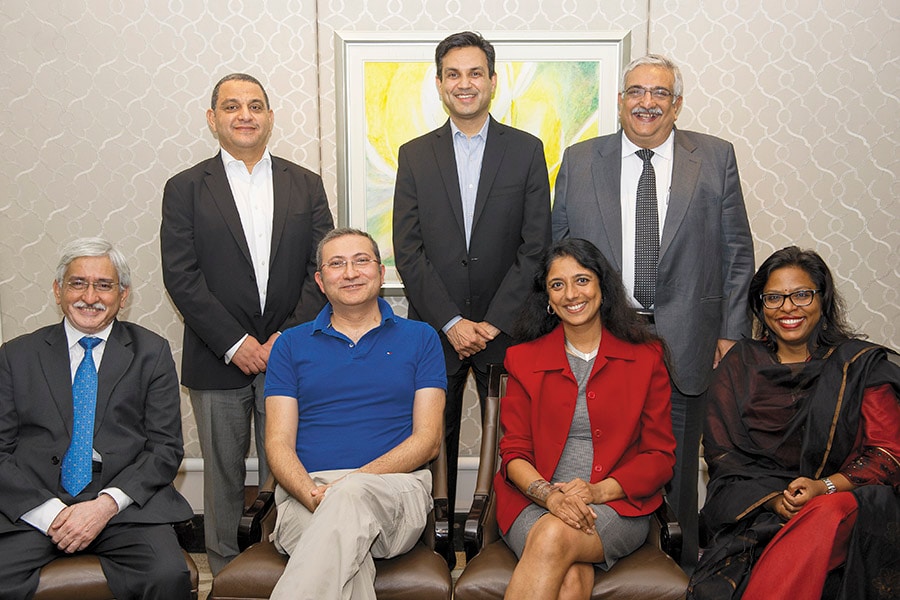
Digital shift an objective or enabler?
Tech transformation will make companies market-ready, feels India Inc, but data-sensitivity should be a priority

Image: Amit Verma
India Inc has reached a consensus on the necessity of digital transformation, but businesses are still at variance on whether technology savvy should be seen as an objective or an enabler.
Senior professionals and entrepreneurs debated this question at the fifth nationwide roundtable hosted in Delhi by Forbes India in association with Microsoft. The panel of this edition of Forbes India LeaderSpeak—The Digital Transformation Series included Ashraf ElArman, managing director of Xerox India; Sanjay Sethi, CEO, ShopClues.com; Manu Dangi, country head (India), Evalueserve; Charulata Ravi Kumar, CEO India, SapientNitro and Razorfish; Sanjeev Nikore, president, strategic initiatives, Tech Mahindra; Vishnu R Dusad, managing director and CEO, Nucleus Software; and Anant Maheshwari, president, Microsoft India.
In his opening comments, ElArman said: “Before anything, we need to first answer the question of whether digital transformation is an objective or an enabler. Some people are confused and they take it as an objective. At Xerox, we utilise digital transformation to improve competitiveness in the marketplace.”
ElArman explained that once Xerox’s customers get their machines, every function is monitored remotely from a delivery centre and optimised. “This makes customers happy as it results in lower prices, proactive service and better security due to reduced human intervention.”
Offering a macro perspective on how a robust digital strategy can bring about a level of enablement, Maheshwari stated that such a transformation can help companies engage with customers better, empower employees and optimise processes and operations.
Internal transformation
But it isn’t always adequate for a company to use digital tools to enable customers without enabling internal stakeholders first.
Nikore of Tech Mahindra stated that his company realised that to change the way it serviced clients in tune with digital times, it needed to rescale it first. “You cannot offer digital transformation to customers unless all your hundred thousand employees understand what it is. Thus, we launched ‘DigitAll’—an initiative to train all our employees to become digital literates first and then master various levels of digitisation,” said Nikore. “We are looking at it as a journey towards digital readiness, where automation is the first piece, as a lot of our services are centered on that. We are experiencing both internal and external changes.”
Enabling society
The digital transformation that is rapidly unfolding at Indian companies also has a broader impact on society at large, the panelists felt.
Taking a cue from the recent government decision to demonetise Rs 1,000 and Rs 500 currency notes, Dusad said Indian society will become far more receptive to transacting digitally over the next two to five years. “Of course, there will be challenges that the society will face while the whole plan pans out,” Dusad said.
However, connectivity issues will have to be overcome across India (especially rural pockets) if the prime minister’s digital vision is to be made a reality. Dusad pointed out that his company Nucleus Software had managed to ameliorate this pain-point by offering customers an offline, cashless payments solution, which it expects to roll out extensively over the coming few months.
Privacy concerns
While more and more services are hosted on new-age digital platforms like the cloud, they are also vulnerable to potential misuse as sensitive and personal information gets stored with the service providers. “While digital brings in transparency and gives you scale, it also takes away privacy. It enables private enterprise but it also encourages monopoly,” said Sethi.
Nikore stated that Tech Mahindra had to significantly increase its expenditure towards providing security for client-sensitive information. “We are making significant investments to comply with the laws. We are not only employing technology teams but also regulatory ones. We also need business consultants, people who can marry business and technology and provide an integrated solution,” he said.
As Maheshwari put it: “The concept of preventing a threat from breaching is outdated. One needs to work with the assumption that the breach has already happened and the focus should shift towards detection and quick response.”
Handling convergence
In order to make a digital transformation strategy truly meaningful, digital technologies need to be aligned with the medium of messaging and human creativity, said SapientNitro’s Kumar; and for that to happen, human resource needs to be skilled appropriately. Citing the example of her own industry, Kumar said India was at the converging point of technology, media and creativity, but there weren’t enough skilled people to handle all three aspects of such convergence.
“As an industry, we are trying to change the thinking around this and change the way recognition is factored around creativity. A lot of this has to be learnt on the job. So we have exchange programmes between our Indian and global teams,” she said.
(This story appears in the 03 February, 2017 issue of Forbes India. To visit our Archives, click here.)
X














